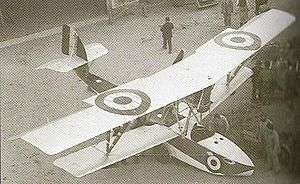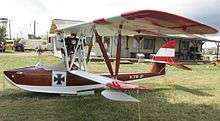Macchi M.5
| Macchi M.5 | |
|---|---|
 | |
| Role | Single-seat fighter flying boat |
| National origin | Italy |
| Manufacturer | Nieuport-Macchi |
| First flight | 1917 |
| Introduction | 1917 |
| Primary user | Italian Navy Aviation |
| Number built | 244 |


The Macchi M.5 was an Italian single-seat fighter flying boat designed and built by Nieuport-Macchi at Varese. It was extremely manoeuvrable and agile and matched the land-based aircraft it had to fight.[1]
Development
The first prototype of a single-seat sesquiplane fighter was the Type M which first flew in 1917. Developed by engineers Buzio and Calzavera it had a single-step hull and an open cockpit forward of the wings and was similar to the earlier Macchi M.3. It was followed by another prototype with a revised tail unit designated the Ma and further developed as the M bis and Ma bis. The production aircraft was designated the M.5 and like the prototypes was powered by a single Isotta Fraschini V.4B engine in pusher configuration. Deliveries soon commenced in the summer of 1917 to the Aviazione per la Regia Marina (Italian Navy Aviation). Late production aircraft had a more powerful Isotta Fraschini V.6 engine and redesigned wingtip floats, they were designated M.5 mod. Macchi produced 200 aircraft and another 44 were built by Società Aeronautica Italiana.
Operational history
The M.5 was operated by five Italian maritime patrol squadrons as a fighter and convoy escort, and some were embarked on the Giuseppe Miraglia. Towards the end of World War I, the aircraft were flown by both United States Navy and United States Marine Corps airmen. Ensign Charles Hammann won the first Medal of Honor awarded to a United States naval aviator in an M.5.[2]
In 1923, when the Regia Aeronautica was formed, 65 M.5s were still in service, although they all had been scrapped within a few years.
In popular culture
In the 1992 Japanese animated film "Porco Rosso", Porco’s fighter when he served with the Italian Navy Aviation during World War I was a Macchi M.5.
Operators
Specifications (M.5)
Data from [1]
General characteristics
- Crew: one
- Length: 8.08 m (26 ft 6 in)
- Wingspan: 11.90 m (39 ft 0½ in)
- Height: 2.85 m (9 ft 4½ in)
- Wing area: 28 m2 (301.4 ft2)
- Empty weight: 720 kg (1,587 lb)
- Gross weight: 990 kg (2,183 lb)
- Powerplant: 1 × Isotta Fraschini V.4B inline piston engine, 119 kW (160 hp)
Performance
- Maximum speed: 189 km/h (117 mph)
- Endurance: 3 hours 40 min
- Service ceiling: 6,200 m (20,340 ft)
Armament
- 2 × fixed, forward-facing .303 British (7.7 mm) Vickers machine guns
See also
| Wikimedia Commons has media related to Macchi M.5. |
Related lists
References
- 1 2 Orbis 1985, page 2393
- ↑ http://www.worldwar1.com/dbc/macchi5.htm
- Taylor, Michael J. H. (1989). Jane's Encyclopedia of Aviation. London: Studio Editions.
- The Illustrated Encyclopedia of Aircraft (Part Work 1982-1985). Orbis Publishing.